
Story by Rick Vacek
Photos by David Kadlubowski
GCU News Bureau
The prizes for the startups were great, but the big winner Wednesday afternoon in Grand Canyon University Arena was entrepreneurship.
There was the huge turnout for the Investment Seminar and then the huge range of ideas displayed by the 10 student teams from seven Arizona universities and community colleges in the AZ Conscious Capitalism Collegiate Challenge. Both inaugural events were exactly what organizers had envisioned: Movers and shakers in the Arizona entrepreneurial community came together in one place and galvanized the call to make business a force for good.
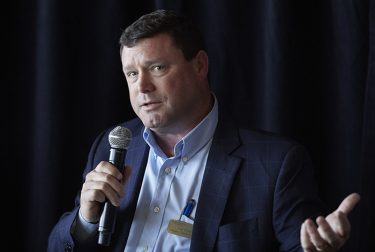
“What a great message for Conscious Capitalism and all of the sponsors,” said Tim Kelley, Assistant Professor for Entrepreneurship and Economics in the Colangelo College of Business at GCU. “That shows how our community really does come together. It’s fascinating.”
It also was a nice victory for a team of GCU students seeking to help small businesses and school districts succeed. Prophet Insight, which made the final five of the recent Canyon Challenge but didn’t take home any of the cash prizes, was one of three teams to win $5,000 in the Collegiate Challenge.
Couple that with the awards handed out to every team – $500, a 12-month membership from Conscious Capitalism Arizona (CCAZ) and a workshop and workspace from MAC6 – and Prophet Insight came out ahead. And that meant other GCU students did, too.
“We’ll have the ability to hire students with this money and have them work with us this summer,” said Braeden Scheer, one of the Prophet Insight organizers along with Josh McGuire. “It benefits our entire ecosystem. Josh and I being business students and having done startup stuff here at GCU long enough, our passion is helping benefit everybody here as much as we can. Hiring undergraduate developers to help us do the development – we’d love to do that.”
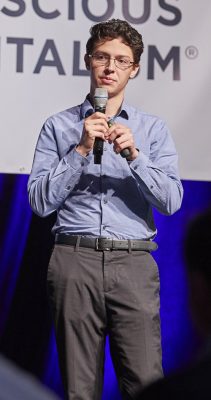
McGuire was onstage making the pitch Wednesday for what he called “democratizing big data” and shared an interesting chart that showed that more small businesses are closing every year while fewer are opening.
Prophet Insight aims to solve that problem by using artificial intelligence, such as IBM Watson, to provide location-based data that would level the playing field and help those small businesses stay afloat.
McGuire said the $5,000 will go straight to development, which is the biggest obstacle facing the new venture.
“Development is where it starts,” he said. “The big piece is that we have to build the interface and also the back-end functionality. If we’re going to enable them to use public data sets, we have to access those and that’s a complicated process.”
The school district piece is of particular interest at GCU, which has heavily invested in the K-12 educational community through its Students Inspiring Students scholarship program, the Learning Lounge, the Canyon Christian Schools Consortium and its work in the Murphy Elementary School District. Big data could make a big difference.
“You can help those administrators learn ways to grow those schools and better serve their students,” Scheer said. “We have an opportunity to take bits and pieces of what GCU has done and help people like Murphy School District understand ways they can implement similar strategies.
“A lot of Christian schools are closing their doors. The same parent who’s paying for the soccer league is also paying tuition. The schools need to find ways to get more revenue to grow – and just to keep them alive.”
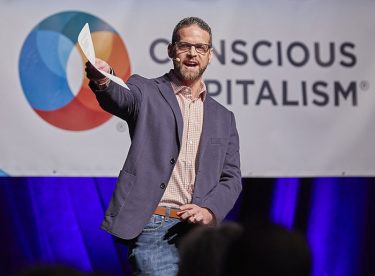
That attitude befit the spirit of the Collegiate Challenge competition, which actually was more of a collaboration, as the emcee, CCAZ board member Brian Mohr of Y Scouts, pointed out.
Every student team was seeking to solve a problem that in some way would better the world, and the ideas ranged from environmental to public safety to physical rehabilitation. The other GCU entry was another Canyon Challenge finalist, Lux Longboard Rentals, which seeks to save people time in getting from Point A to Point B by making electric longboards available at kiosks.
Lux creator Weston Smith had a good answer for the judges when he was asked about safety. Standing on a longboard that has handles, he said, “It’s mother-approved, and I just got approval from my grandmother. She said she’s going to try it out.”
The entries that were most well-rewarded by the judges with the more than $60,000 in prizes -- up from the previously announced figure of $40,000-plus -- were Blare and Ecocrete from the University of Arizona, Turnoverbnb from Arizona State University and Kustom Tyres & Supplies from GateWay Community College.
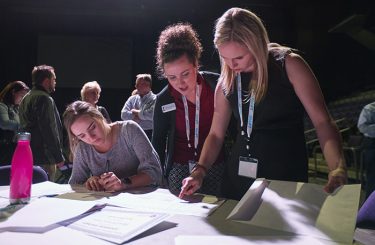
The student team from Blare has designed a bracelet that women can activate when they feel they are in a dangerous situation. It automatically sends a text message to friends and the police that shows the wearer’s location.
Ecocrete is a new way to make concrete that’s environmentally friendly by reducing the footprint of the mining and energy industries.
Turnoverbnb would solve the challenge of getting vacation rentals cleaned by setting up service providers to do the work on a regular, no-call-needed basis.
Kustom Tyres is already in revenue as a business that can customize a sidewall tire for any car.
“I loved the student businesses,” said Kelley, a key mentor for the student businesses coming out of GCU. “You can see the caliber of the ideas that they’ve been generating and the support from the institutions they represent. You can see that they’re toned, they’re professional. I thought they all did a great job pitching. It’s exciting to see the diversity of different ideas to solve different problems.”
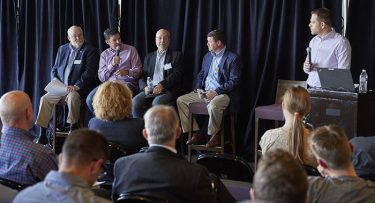
Dr. Randy Gibb, dean of the Colangelo College of Business at GCU and the impetus behind creating the Collegiate Challenge, noted the importance of having a long table filled with judges from major corporations and government entities across the state.
“Those are all key organizations. These are key players,” he said.
The key players also showed up in droves to hear more about angel investing, which Kelley has pushed in the spirit of keeping entrepreneurship in Arizona. Nearly 200 people RSVP’d, and the crowd kept growing to the point where more chairs had to be brought in.
After presentations by Kelley and Sandra Watson, President and CEO of the Arizona Commerce Authority, a panel of Kelley, Curtis Gunn of the Tucson-based Desert Angels, Jim Goulka of Arizona Tech Investors and Gary Gibbons of the Thunderbird Angels shared their insights.
Having Watson, Gunn and Goulka on board is particularly important, in the opinion of the Scott McIntosh, the CCAZ founder and chairman of the board.
“They’re beyond intrigued. We’ve got them highly interested,” he said. “Those three are just so connected to the entire community.”
In the end, that’s what the afternoon was about – relationships. McIntosh expressed hope that coupling the event with the Conscious Capitalism international conference, scheduled to come to Phoenix next spring, will create even more synergy around the Collegiate Challenge.
But the relationships already are being created. Gibb said several major industry players were impressed with what Prophet Insight is proposing.
“It’s not always about the prize up on the stage, it’s the relationship you made before and after the event that might truly be the thing that takes you to the next level as a business,” he said.
Mohr began the event by citing a belief shared by economist Milton Friedman a half-century ago: “The goal of the firm is to maximize profits and return a portion of those profits to shareholders as a reward for the risk they took in investing in the firm.”
If Collegiate Challenge were held then, Mohr said, all 10 ideas would have been about bettering the bottom line. But Conscious Capitalism aims higher, in the direction of the greater good of society – and the student entries reflected that.
“This is the future,” he said. “These are our future leaders. These are our future businesses.”
Contact Rick Vacek at (602) 639-8203 or [email protected].






































































